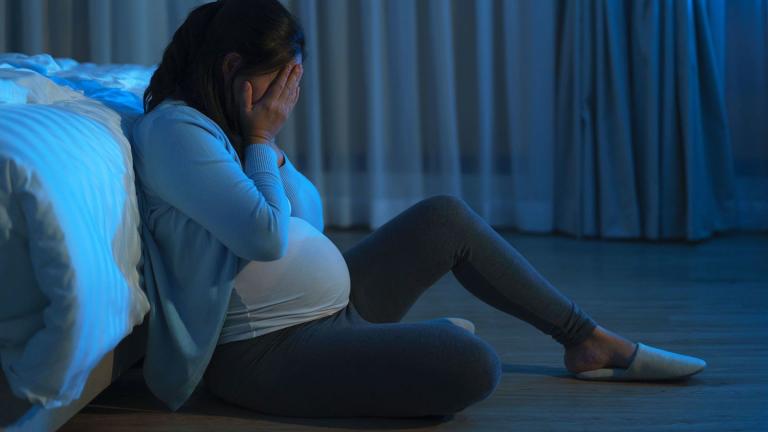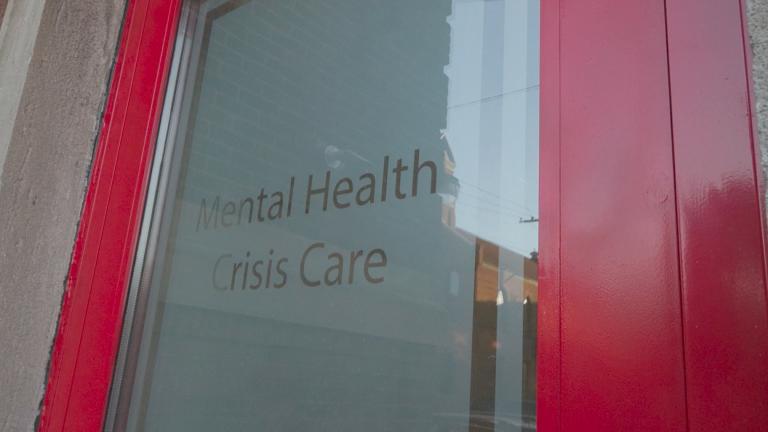 (Illustration by ProPublica. Source images: Whitney Curtis for ProPublica and Equip for Equality Report.)
(Illustration by ProPublica. Source images: Whitney Curtis for ProPublica and Equip for Equality Report.)
State officials this week named a new leader of Choate Mental Health and Developmental Center amid a drumbeat of criticism and investigations into abuse and poor care at the southern Illinois facility.
Bryant Davis, who served as Choate’s top administrator since 2014, has been replaced by Stephany Hoehner, who has worked as a project manager at the facility since March, according to an email to staff on Monday obtained by reporters.
In March, Illinois Department of Human Services Secretary Grace Hou unveiled a plan to move more than half of Choate’s 225 residents with developmental disabilities out within three years and improve safety at the center for those who remained. She also announced that the state would undertake a review of the best use for the facility. At the time, Hou told reporters that she decided to keep the facility leaders in place during the transition for continuity because they’ve known many of the patients and their guardians for years.
The department’s about-face on Choate’s top leader follows months of reporting on poor conditions at the facility by Capitol News Illinois, Lee Enterprises Midwest and ProPublica. And it comes on the heels of a sweeping new report from Equip for Equality, the state’s federally designated advocacy and protection agency for people with developmental disabilities.
After months of monitoring the facility at IDHS’ request, the nonprofit made recommendations that drew a hard line: Regardless of who is in charge, “no individuals with developmental disabilities should remain at Choate.”
Equip for Equality’s report, titled “Why No One Should be Left Behind,” detailed ongoing, serious lapses in care and recommended that the remaining residents with developmental disabilities who live there be moved out.
Equip for Equality also reported that its site visits between October and July found that little has changed for the residents of the facility, despite the department’s reforms. Choate patients told the monitors that they continued to feel unsafe. They reported numerous serious abuse allegations, and said many instances of abuse go unreported because the staff has a history of taking away patients’ privileges as retaliation.
Patients told Equip for Equality monitors that they’ve been slapped, punched, choked and threatened as punishment at Choate. In late 2022, a patient said an employee slapped her after she reported that person for abuse. She feels “threatened and scared” and cries everyday, the report stated. She told the monitor, “It hurts my heart to be here.”
The facility has also failed to ensure residents received the care they needed, the report said, leading to instances of self-harm such as an incident in September where a patient tore off all 10 of their toenails.
Keeping people with developmental disabilities at Choate is “antithetical to their well-being and the reason for their placement” because they are subjected to abuse and neglect, and are not receiving the intensive treatment they need to transition out, the report said.
Residents frequently felt “bored” and had few opportunities to engage in meaningful activities such as developing work and life skills, the report said. The monitors also observed that residents spent most of their days watching television, sleeping or doing arts and crafts.
Further, residents were subjected to unnecessary restraints and verbal abuse. These safety issues and failures of care were not isolated to the residents whom state officials have prioritized for relocation, the report said.
The report cited the case of a nurse who, according to IDHS’ inspector general, failed to follow procedures when she ordered a patient into restraints. The nurse told an investigator with the IDHS Office of the Inspector General, the agency’s watchdog, that the patient became angry after she did not immediately answer a question about his medication and he pushed a medicine cart at her, threw a water bottle and tried to attack her. The patient was escorted to his room, then the nurse ordered restraints.
The OIG found she failed to assess the patient’s mental status at the time of the order as required by IDHS policy. At least three technicians and a lead worker told an OIG investigator that the patient was calm at the time a nurse ordered the restraints, though other workers gave conflicting accounts. The nurse was reassigned during the 13-month investigation.
“In the end, it not only appears that the restraints were used in a retaliatory manner, but the whole incident could have been avoided if the nurse had respected his right to ask questions about his medication,” the report stated.
Capitol News Illinois reporters discovered this nurse applied for and received a supervisory position in the midst of that ongoing investigation. Eight months after taking that job, the OIG substantiated the neglect claim against the nurse in the restraint case.
In her request for reconsideration of the finding, the nurse denied any wrongdoing. That request for reconsideration was denied.
IDHS said in a statement that it imposed “administrative consequences” on the nurse after the completion of the OIG investigation. She remains a nursing supervisor at Choate.
The report also faulted administrators for not taking timely and robust action to address problems, and said they have “failed to demonstrate the ability to right the ship and keep individuals safe.” That finding echoed a June OIG report, which said leadership had failed to hold employees accountable and accepted “substandard work performance.” That same month, the Illinois Department of Public Health found filthy conditions in the units, including peeling paint, feces in the shower and on a patient’s bedding, and dried tobacco spittle covering a clock radio
In July, the news organizations documented ongoing problems under current leaders at Choate despite IDHS’ reform promises.
Davis began at Choate as a social worker in 2000. He became facility director in 2014, responsible for staffing decisions, employee evaluations, responding to critical incidents and discipline for both the mental health and developmental disability divisions at Choate, according to job descriptions. Davis received an annual salary of $133,000. He declined to comment through an IDHS spokesperson.
Davis, along with Assistant Facility Director Teresa Smith and Quality Assurance Manager Gary Goins, faced charges of official misconduct last year for allegedly interfering with a patient abuse investigation. The charges against the three were later dropped by the prosecutor.
Smith and Goins will remain in their current positions. They also declined to comment through an IDHS spokesperson.
In response to a question about Davis’ future with the agency, IDHS said in an email: “Davis will no longer work at Choate following a one-month transition period. At this time, we are not able to share anything beyond that.”
But Equip for Equality, in its report, cautioned that changing leadership isn’t enough to fix conditions for the residents with developmental disabilities at Choate. It found deeper cultural problems at the facility have taken root over several decades. Appointing new leadership “could serve as a distraction that only delays the timely transition of all individuals with developmental disabilities away from Choate,” according to the report. The report did not address the much smaller state-run psychiatric hospital that is also on the grounds of the 229-acre campus.
Equip for Equality has had monitors stationed at Choate on and off since 2021. IDHS officials requested their assessment of Choate on the heels of a rash of arrests of employees on felony charges alleging abuse and cover-ups. Since then, the monitors have logged more than 2,000 hours on the facility’s grounds.
Last summer, in part based on Equip for Equality’s review, IDHS implemented a series of care and safety reforms. Those included adding surveillance cameras to public areas, beefing up security and improving services for residents who needed therapy to address trauma they’d experienced and for those who wanted help transitioning from the institution and into a community home.
“Despite the state’s ongoing investments in this institution and the high level of scrutiny it has been under since early 2021,” Equip for Equality’s report said, it is clear that “an influx of more resources will not fix the multiple and serious problems at Choate.”
This is the second comprehensive report on poor conditions at Choate from Equip for Equality in the past two decades. It was strikingly similar to the organization’s 2005 monitoring report detailing abuse and poor care, which was followed by a Department of Justice investigation two years later.
“Here we are 20 years later with the same problems,” said Stacey Aschemann, vice president of Equip for Equality’s monitoring unit.
IDHS spokesperson Rachel Otwell said in a statement that the agency is evaluating Equip for Equality’s report, alongside other recent reports from the OIG and the Southern Illinois University School of Medicine, which provided recommendations to repurpose Choate and address safety and staffing issues.
“Ultimately, the department wants to serve patients and residents in the best possible way, retain excellent staff, and strengthen the Choate campus to serve the public interest,” she said.
At present, the department is committed to “the careful transition of the 123 residents” previously identified to be moved by state officials. “It is critical to focus on these early moves to ensure they are smooth and successful for the long term.”
Since the plan was announced in early March, 19 residents have moved out of Choate. About half of those moved to other developmental centers, which have also been linked to cases of abuse and neglect.








